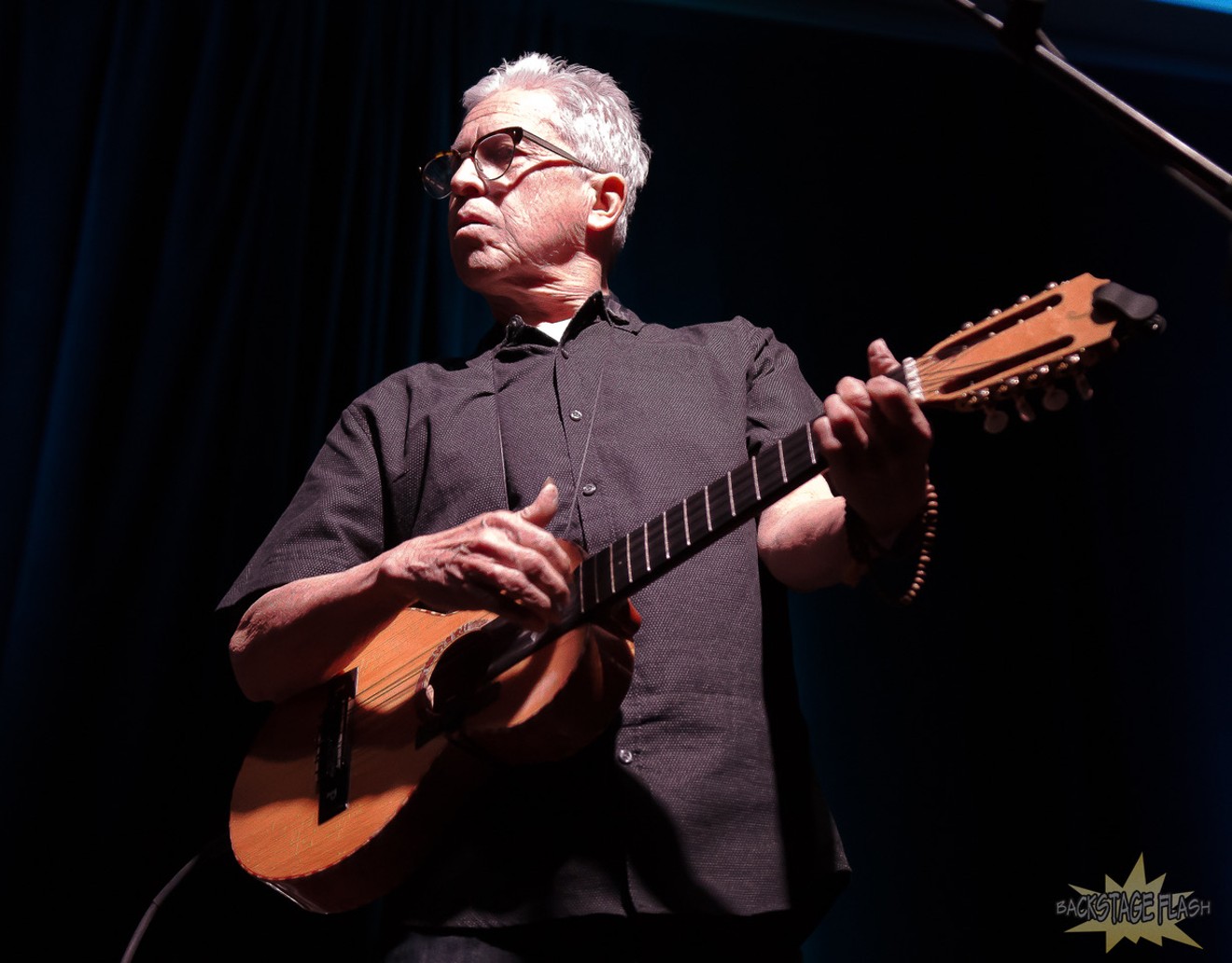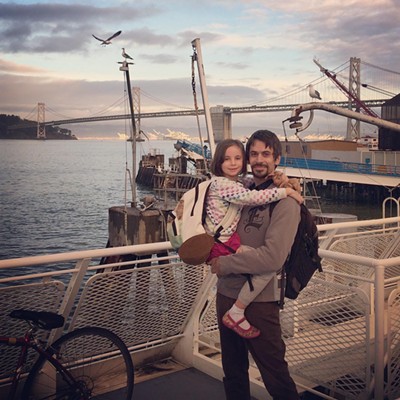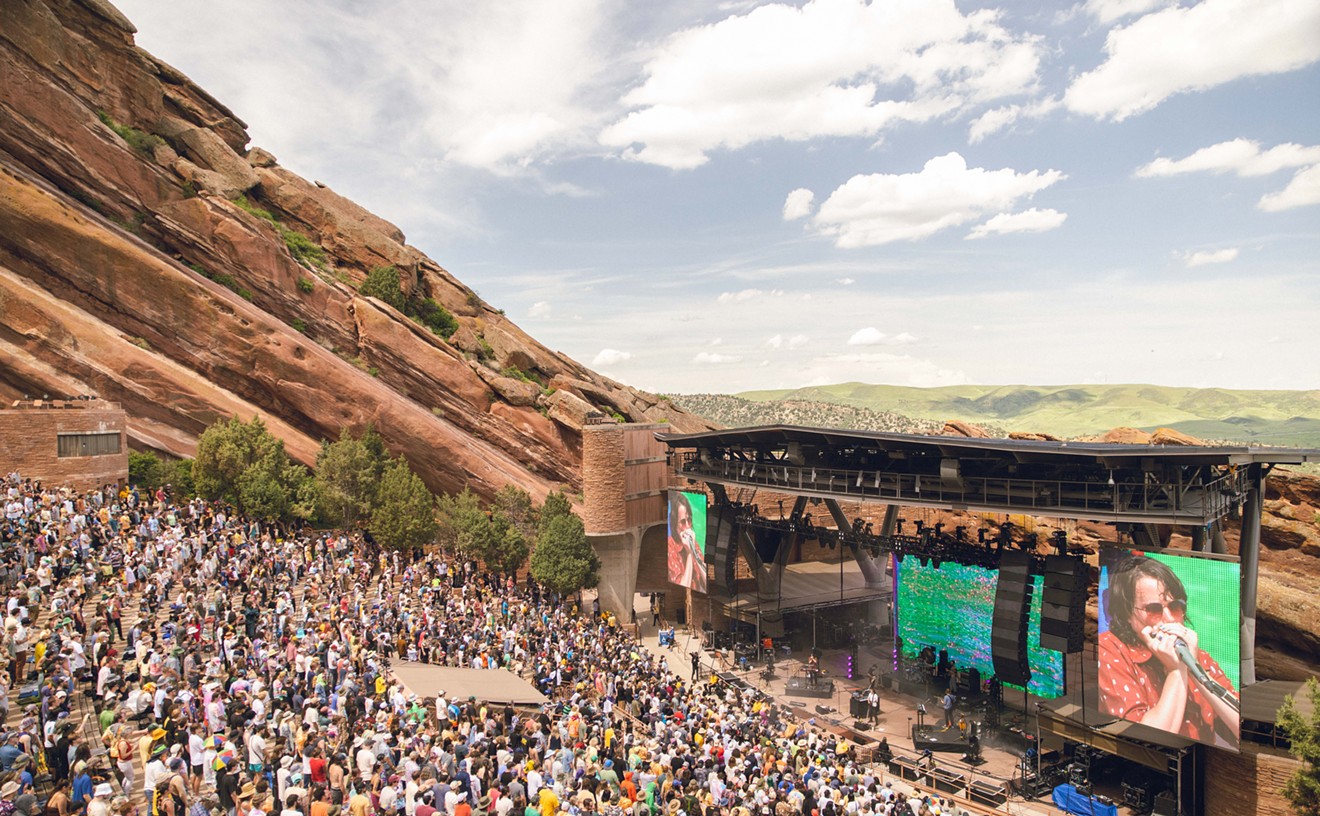With short white hair, a dark button-down shirt, Chuck Taylors and a death stare that could rival that of legendary Oakland Athletics pitcher Dave Stewart, Louie Pérez — one of four founding members of the enduring L.A. band Los Lobos — cut a unique figure on stage at the Stanley Hotel on Saturday. Although Pérez only stands about as tall as Los Lobos singer/guitarist David Hidalgo's shoulders, the smaller man (the band's longtime drummer, but now mainly a jarana player, guitarist and songwriter) has always been the quiet but powerful force behind Los Lobos's lyrics and ethos.
Author of a collection of poetry, songs and art called Good Morning, Aztlán (Tia Chucha Press) that'll be released later this month, Pérez spoke with Westword before Los Lobos returned to the Stanley on Saturday about the band's long history in Colorado, his reaction to the Trump presidency and the meaning of Aztlán.
Westword: Are you excited to be back at the Stanley Hotel?
Louie Pérez: It’s a really cool venue, and they’re really nice people. They really take care of you, unlike some of these venues. With some of them, it’s a slice of baloney and a loaf of Wonder Bread.
Have you seen any ghosts yet?
No, I haven’t seen anything like that yet. I’m actually a little disappointed [laughs].
You’ve been playing in Colorado for a lot of years.
We actually started touring in 1983, after the first EP [...And a Time to Dance] came out. So 1983-’84 we pretty much went everywhere — so, of course, Denver. I remember the show, as a matter of fact. It was at a fairly good-sized place called the Rainbow [Music Hall]. It’s probably a Walmart or something now. But that was the first place I remember that we played.
In the course of, I don’t know, 35 years…we’ve been everywhere, and Denver has always been the place to be. Colorado in general is great. Boulder has the Boulder Theater, Chautauqua…we’ve done all of that. And Fort Collins a few times. We’ve actually been witnesses of how things change. I don’t think Boulder has changed very much; maybe Pearl Street has changed. Maybe it’s a little groovier now. But Colorado has been a very cool place; we’ve even played Durango a few times.
It seems like you’ve played everywhere in Colorado, even the Louisville Street Faire.
Well, when you’ve been around for as long as we have, you just play everywhere. I used to say that we’ve been around for so long that if you’re a Mexican-American and you got married between 1973 and 1983, we probably played your wedding. We still get people who say, “Oh, yeah! I remember when you played my uncle’s brother’s niece’s friend’s wedding.” I go, “Okay, great.” The other thing is that you grow older, and you don’t know shit anymore.
Los Lobos has really threaded its way through American culture. Many people know you from La Bamba, but I read John Doe’s history of the L.A. punk scene and saw all these baby-faced photos of you guys alongside all the hardcore bands.
Well, it was that scene that we got our first exposure from. Nothing would’ve ever happened if we hadn’t played those punk-rock clubs. It was really an unusual thing for us to do, because we were safely on our side of the river playing East L.A., playing the weddings. But our M.O. was always to do the things that felt right, and we went that way. We just followed our instincts. We never rubbed our hands together like, “Wow, we can become big stars.” We were giving up a $400 wedding gig on a Saturday to go play some Chinese restaurant with punk-rock bands. So it’s not exactly real smart. But it just felt right. As a matter of fact, there’s gonna be a new book; they’re collecting essays from a lot of people who were around the [early 1980s L.A. punk] scene, and there’s gonna be a second book called More Fun in the New World, and it’s gonna be out in [June]. Everything from Keith Morris of Circle Jerks to just everybody, and I wrote a piece for it, too.
Many musicians will say that Los Lobos is one of the most respected, influential American bands, while someone like Bon Jovi is in the Rock and Roll Hall of Fame. Do you feel like the Velvet Underground of Latino music? Do you feel underrated?
I think you could ask just about anybody and they know who we are, just by the nature of we’ve been around so damn long. We just celebrated our 45th anniversary in November. That’s a long time. If you stand out in front of your house and you wait long enough, you’ll probably see us drive by. And we’re getting better as musicians. We don’t play a song the same way twice, and it’s intriguing for a lot of people.
There’s some really fine musicians in the band, and I think people respect that. And I’m not trying to pat myself on the back, but David and I have been writing songs for a long time, and — if I could be just a fly on the wall, preserving all this stuff — this band Los Lobos, considering where they came from, just four young Mexican American kids from the ’hood in East L.A., we’ve kind of defied any definition of what most people would expect from a band that’s made up of people like us. We’ve been everywhere and done everything, and I’d say we get respect from people all over. And the music we play is nothing like anybody would expect. And we’re still maintaining the core of who we are, if you know what I mean. We have never smoothed over or censored ourselves; we’re Mexican-American guys from East L.A., and we write about it, too.
The songs that I’ve written have always come from my own personal experience, and giving voice to the people that I’ve seen. Maybe those are the people who are underrated. Maybe it’s the Mexican community and the people who’ve populated that community that’ve been overlooked. And things are changing. But then, because of current things going on in the political world, if you know what I mean, we’ve had some pretty major setbacks over the last two years.
For all of these things, if you put it all together, it makes up a very unusual, maybe unique, people or band or whatever you want to call us. A set of circumstances has created us. I’m flattered; I’m humbled by the stuff that goes on, because for us, we’ve always just done the work. We’ve always just done what’s right in front of us. We get all these accolades, and we look over our shoulders to see who they’re talking about. We just do the work. I tell kids, “Get into this stuff because you love it, not because you want to become a rock star. If you do it because you wanna be a rock star, you’re probably gonna be disappointed. If you do it because you love it, it’ll never let you down.” And I think that’s what we’ve done, because it’s the stuff that feels right.
Two-part question: You guys haven’t made a record in almost five years, and I’m wondering if America under Trump has made you think about writing protest songs. But also, are songs like “Will the Wolf Survive?” now taking on new meaning?
Second part first, I guess. Yeah, in 1985, "Will the Wolf Survive?" was out, and that particular song talked about using the wolf as a metaphor for people who have not been understood or given their equal shake. And on that same record was “A Matter of Time,” which was a song about an immigrant who leaves his home and the people he loves because he can’t get by, and he needs to cross the border to come to the U.S. to try to make ends meet. The lyric is him having a conversation, saying goodbye to his wife, who he’s gonna leave in the middle of the night. And that was thirty years ago! One would think something would change by now. There were certainly some significant inroads and advances.
When we first started traveling, touring around the U.S., we’d go to places like Vermont, North Carolina, Georgia…and there wasn’t a brown face anywhere. It made us feel like we were on some kind of a mission, spreading the word far and near about who we are, to redefine a lot of those stereotypes. Back then, you figure that if you were from Pocatello, Idaho, the only reference you had to a Mexican was a Cheech and Chong movie. So it felt like we were on some kind of crusade. But now…I’ve seen the face of America change, and that face is brown whether you like it or not.
Now Latinos and Mexican people are all over the U.S., and even though there have been a lot of advances going on, this particular person, Donald Trump, has set us back quite a bit. Those people who probably felt threatened because of their own xenophobic mentality, racist view of things, maybe felt they had to keep their mouths shut because they didn’t like the fact that America was changing, and they didn’t like that America was a multicultural nation…he gave voice to these people. They think, “We can talk shit now!” and all these people just came out of everywhere, and they said, “We don’t like it. Let’s send them all back.” And that’s what set us all the way back to where in 1984, when I wrote that song, and even further back, when we were playing in the early ’70s and there were all these Chicano movements going on, and even in 1969, when there were walkouts because Mexican-American kids were being sent to shop classes instead of advanced placement, we seemed to have come a long way — until now.
Put it this way: When Donald Trump was elected, I didn’t talk to my sister for two or three days. Finally I contacted her; I said, “This has been quite a shock, and I apologize for being quiet.” She said, “Louie, this is no time to be quiet.” And really, that’s it. And the stuff that I’ve written…I’ve never completely been quiet.
When I put together this book, Good Morning, Aztlán, I thought, “This is something self-indulgent,” and I was really kind of weird about it, all these writings and poetry, and people writing essays about stuff that I’ve done, and 100 song lyrics. Finally, when I laid it all out on the table, I thought, “This is not about me in particular.” It’s got my name on the cover, but it’s everybody’s voices in there, people who I remember from when I was a little kid to now. So I guess that’s a long-form answer to your question about what I would do now.
I’ve always written about and reflected about the times we live in, and it’s never been from a position of carrying a picket sign. I think I represent, in just the nature of what this band is…we didn’t change the name to, like, the Electric Cherry or something. It’s been named Los Lobos all along. And the fact remains that in 1987, the number-one song in the world ["La Bamba"] was a traditional Mexican song played by four Mexican kids from East L.A. That’s quite a statement, I think.
But now is a time to be a little more vocal, a little more assertive about who we are and what’s going on with us. And if there was another record in the pipe — and there isn’t one yet — yeah, it would be something we certainly would address. But in the meantime…we did a PSA during this last run of elections to get the vote out in the Southwest, in one area in particular, in New Mexico. It made a difference. It got people out to do stuff. And if we have any kind of notoriety, if we have anything that makes a difference in the world, for us to be something or to say something, we’re gonna say something.
Can you think of anyone else in rock history who’s as much of a "Wizard of Oz" behind a band as you, playing drums and writing songs but not being the frontman? I could only think of Neil Peart from Rush.
Wow. Thank you. That’s a huge compliment. That means a lot. I mean, I’ve always read, and I remember picking up a book years ago, reading Langston Hughes and saying, “Shit. There’s nobody like this. This is like the poet version of Martin Luther King. This is incredible.”
I kind of modeled what I do after things that influence me, that I’ve always appreciated. Not that I’m thinking that I would be one of those, but...I’ve gotta learn to accept compliments, I guess. And I appreciate that people can see the things that I’ve done. We’re not just a band that’s good to dance to. We are that, yeah, but if you also care to get a little insight, maybe we can provide a little bit of that. I’ve been just so fortunate to be in the position that I am — number one, to give voices to those voices that’ve gone unheard. And I’ve got the dream job. I’m just so grateful for being able to do what I do, and if people enjoy it and have a good time and are moved a little bit, even one person, then I think I’ve already done my job.
You’ve been working with David for 45 years, on so many projects, from Los Lobos to Latin Playboys and a lot more. Do you ever get sick of each other?
I think the separation’s kind of already built in there. We all kind of identify our spaces. When we get to the airport when we get home, nobody even says goodbye. We’re not one of these bands that can’t stand each other, that gets on separate buses because they just can’t be in the same room together. It’s not that, because it also reflects other things in the band. I mean, we’re brothers and we don’t even have to say it out loud that if you took the music away, if you took all this stuff away, you’ve have four guys who grew up together. Our parents all knew each other, all our moms knew each other, we all grew up in the same neighborhood, and we all experienced the same things. That’s what remains no matter what. If you took all this stuff away, you’d have four guys that’ve been brothers for 45 years. Longer than that, you know?
Does the term "Aztlán" encompass that kinship, that community and love you’re talking about?
It does. I mean, historically, Aztlán is the beginning or the core of what the indigenous people were in this part of the world. It encompasses a lot of things, yeah, and you could go into this whole thing of the concept of this cosmic Chicano thing. It’s not some metaphysical thing; it’s just really the truth, because for Mexican-American kids like us in East L.A. that grew up there, it means something, because we weren’t ever really accepted in Mexico. It was, “What are you?” They never considered us really Mexicans. Then over here in the United States, we were never accepted as Americans. So what do you do when you don’t belong anywhere? If you have the right attitude and the right perspective, you belong everywhere. So we’re not understood or whatever, but we made a rock band and we go everywhere. That’s what we did.
[
{
"name": "Air - MediumRectangle - Inline Content - Mobile Display Size",
"component": "12017618",
"insertPoint": "2",
"requiredCountToDisplay": "2"
},{
"name": "Editor Picks",
"component": "17242653",
"insertPoint": "4",
"requiredCountToDisplay": "1"
},{
"name": "Inline Links",
"component": "18838239",
"insertPoint": "8th",
"startingPoint": 8,
"requiredCountToDisplay": "7",
"maxInsertions": 25
},{
"name": "Air - MediumRectangle - Combo - Inline Content",
"component": "17261320",
"insertPoint": "8th",
"startingPoint": 8,
"requiredCountToDisplay": "7",
"maxInsertions": 25
},{
"name": "Inline Links",
"component": "18838239",
"insertPoint": "8th",
"startingPoint": 12,
"requiredCountToDisplay": "11",
"maxInsertions": 25
},{
"name": "Air - Leaderboard Tower - Combo - Inline Content",
"component": "17261321",
"insertPoint": "8th",
"startingPoint": 12,
"requiredCountToDisplay": "11",
"maxInsertions": 25
}
]













